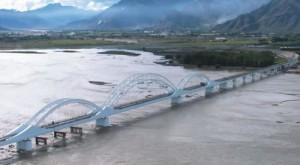
An image of the new railway bridge on the Kyichu River in the Toelong Dechen area in the western area of Lhasa.
This intensified focus on security by the Chinese authorities during the opening of the new railway to Lhasa, the centerpiece of China’s plans to develop its western regions, is a further indication of Beijing’s concerns about ‘stability’ in the region at a critical time as well as its intention to prevent any possible disturbances such as protests by the international Tibet movement or sabotage along the route.
The Chinese official press today specifically criticized foreign journalists’ coverage of the railway opening, saying that reporters on the press trip from Beijing to Lhasa on July 1 harbored ‘doubt’ and ‘hostility’ towards China (People’s Daily, ‘The Same Railways, but Different Psychologies’, July 12, 2006) because many reports stated that the railway would threaten the survival of Tibet’s culture, and benefit Chinese rather than Tibetans.
The Ministry of Public Security statements praising the role of armed security personnel in the past week follow news of a conference in Lhasa in June of Supreme People’s Court and Party officials to discuss the need for plans to address ‘problems’ that could result from the railway’s operation. The conference on ‘The Judicial Response to the Opening of the Qinghai-Tibet Railroad’ in Lhasa on June 15 asserted the need for the legal system to support “striking hard against illegal activities along the railroad and assuring Tibetan political and social stability”. (China Court Network report, June 16).1 Vice President Zhang Jun of the Supreme People’s Court stressed that courts along the rail line, the principal terminals of which are Xining and Lhasa, must strengthen their “communication and cooperation” to coordinate efforts to “resolve problems.”
A hundred armed guards were hand-picked to travel on the inaugural journey of the railway from Beijing on July 1, according to an article published in Chinese on the website of the Ministry of Public Security.2 These armed security personnel were “patriotic and politically well-educated” as well as being physically fit, and with some knowledge of the Tibetan language and culture, according to the report.
The day after the first train arrived from Beijing to Lhasa, the Minister of Public Security Zhou Yongkang publicly congratulated all army officers, soldiers and armed police for their “accomplishment of security duties” during the celebration for the opening of the Qinghai-Tibet railway. Using terminology similar to that of a military campaign, a circular3 distributed by the Ministry of Public Security on July 4 stated that ‘normal social order’ had been maintained throughout the ceremonies, and that during the past five years of construction, armed police and soldiers had “fought bravely on the plateau, unpopulated areas and tundra”…”overcoming numerous difficulties, including oxygen deficiency, hostile climate”. Minister Zhou, a member of China’s Politburo and a former Party Secretary of Sichuan province, said in his tribute: “The Public Security bureau, the railroad public security bureau, and the armed police from Qinghai Province and Tibet Autonomous Region, based on the central government’s strategic decision and the Ministry of Public Security’s unified deployment, under the leadership of local Party committees, local governments, Party committees of the Ministry of Railways and the headquarters of the armed police, through whole-hearted engagement, full mobilization, thorough deployment, and wide mass mobilization, have practically strengthened safety and security work in every aspect, guaranteed the celebration and safety of the first train and leading comrades from the central government … and has laid the solid foundation of the safety for the entire line of this railroad in future.”
China’s President and Party Secretary Hu Jintao has described ‘four enlightenments’ resulting from the railway – including Chinese diligence in overcoming technical problems en route, helping the economy, opening Tibet for tourism and trade, and further unifying Tibet and China. But the intensification of security and focus on the ‘patriotism’ of those responsible for its implementation indicate that the Party is well aware that Tibetans may not hold the same views.
The People’s Daily, a newspaper of the Central Party Committee, said today that: “We feel quite soured and saddened after reading some of these reports and commentaries from Western media colleagues [on the opening of the railway]. The wheel of history has run into the 21st century, but the mentality of these people remained in those days over a century ago, still with doubts and some hostilities against China.” The People’s Daily singled out coverage by the BBC and also by the New York Times, which had reported that Tibetan and foreign critics said that the railway benefits Chinese at the expense of Tibetans.
The newspaper queries why there is favorable coverage in Western newspapers and text-books on the construction of the railroad across the American West – which hastened the demise of native American Indians – more than a century ago, and not on China’s construction of a railway on the Tibetan plateau in 2006.
An ICT report on the railway with images of the new railway station in Lhasa can be downloaded here »
Footnotes
1 Reported by the Congressional-Executive Commission on China at www.cecc.gov on June 26, 2006
2 Qinghai-Tibet Railway: On-Duty Police Ready and Waiting to Protect Safe Journey of Travelers Entering Tibet, July 3, 2005
3 Ministry of Public Security Circular Commends Work Units That Took Part in Safety Protection During Celebration of Qinghai-Tibet Rail, July 4, 2006

